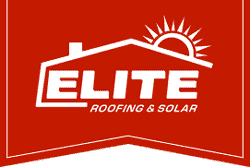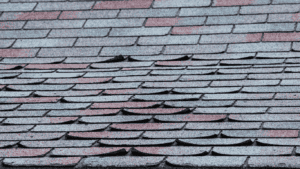Commercial flat roofing is a popular choice for many commercial construction projects because of its impressive efficiency and practicality. It is commonly used in warehouses, big box stores, and office blocks, as it allows for maximum utilization of space, both inside and outside the building. This means that there is ample room for storage and essential systems, like HVAC.
But what is a flat roof, exactly? And what materials can these roofing systems be made of? At Elite Roofing, we often field questions about commercial flat roofing systems, and we take pride in helping customers choose the right fit for their business’s needs. We’ve worked on a great many flat roof systems over the years, so in today’s post we’re sharing that knowledge and experience. Let’s get started!
What is a flat roof?
The first thing to know about flat roofing systems is that they aren’t truly flat—indeed, no roof is as this would lead to major problems when it comes to water runoff. But while all roofs have a pitch, most commercial roofing systems have a relatively low slope. Commercial flat roofing pushes this boundary as far as it can go. Definitions vary, but typically flat roofs are any roofs with a pitch between 1 and 10 degrees (and no more than 12.5 degrees), while low-slope roofs can range up to 25 degrees. The specific pitch is always a trade-off—flatter roofs typically offer maximum economy and space-saving efficiency, but may increase the likelihood of water leakage.
Built-up roofing systems
One of the oldest forms of commercial flat roofing, built-up roofing systems (or BUR) are so named due to the manner of construction. Alternating layers of asphalt paper and tar are installed on the roof, forming a watertight (and extremely durable) seal. The number of layers can vary greatly depending on the contractor, but around 5-10 layers is typical. The installation process is long and laborious, as each layer must dry completely before the next can be installed, making for a more costly roofing system. However, BUR roofs typically last a long time, standing up very well to aging and general wear-and-tear.
Metal panel systems
Most commonly seen on warehouses and industrial facilities (such as factories), metal roofs are an incredibly sturdy and reliable commercial roofing solution. For flat roofs, panel systems are typically the only metal roofing option, with the panels spanning between rafters for support. A sealant fills any seams or joints between the panels, making the roof impervious to water. While generally more expensive than single-ply roofing systems, metal panel roofs are much more durable, as the metal panels are vulnerable only to rust (or wind, if the panels aren’t properly fastened).
Single-ply membrane systems
Typically the most economical option in the short term, single-ply membrane systems describe roofs that are covered with a thin yet durable sheet of synthetic rubber, vinyl, or similar materials. Varieties of single-ply membrane systems include EPDM, TPO, and PVC. Each of these materials has advantages and disadvantages when it comes to durability, resistance to the elements (water in particular), and energy savings.
Since all three come in sections, the primary challenge of single-ply membrane roofs is properly sealing the seams between the rolls or panels of material. PVC and TPO are typically heat-welded, while EPDM (colloquially referred to as a “rubber roof”) uses a liquid adhesive between the rolls of rubber material. In general, EPDM stands up better against hail and other impact damage, while the heat sealing used in TPO and PVC roofing gives them an edge when it comes to water resistance. It’s a good idea to talk to a professional commercial roofer about the pros and cons of each material before deciding on a commercial flat roofing material.
Elite Roofing: Reliable Commercial Flat Roofing
The right flat roofing solution for your building depends on your needs in terms of durability and cost-efficiency. If you’re interested in discussing which commercial flat roofing system is right for you, our expert team at Elite Roofing is ready to help. We have decades of experience installing commercial roofs throughout the Denver area and beyond. Our family values mean we know exactly how crucial it is to protect your livelihood with a solid and reliable roofing system. Whether you’re choosing between metal and BUR, or deciding which single-ply material is right for you, contact us today!









